An Analysis of the Sources of Law in England and Wales (Business Law)
VerifiedAdded on 2023/05/31
|10
|2858
|316
Essay
AI Summary
This essay provides a comprehensive analysis of the sources of law in England and Wales, encompassing both internal and external influences. It begins by exploring the internal sources, including statute law, which is primarily derived from Acts of Parliament, and common law, which is based on customs and legal precedents established by judges. The essay then delves into the impact of European Union Law, detailing its incorporation into UK law through the European Communities Act 1972 and its subsequent influence on the legal system. Furthermore, the essay examines the European Convention on Human Rights and its role in shaping English law through the Human Rights Act 1998. The discussion also touches upon the interconnectedness of these sources and the influence of international law on the UK legal framework. The essay concludes by highlighting the significance of these sources in the overall development and application of law in England and Wales, emphasizing their relevance within a business context.
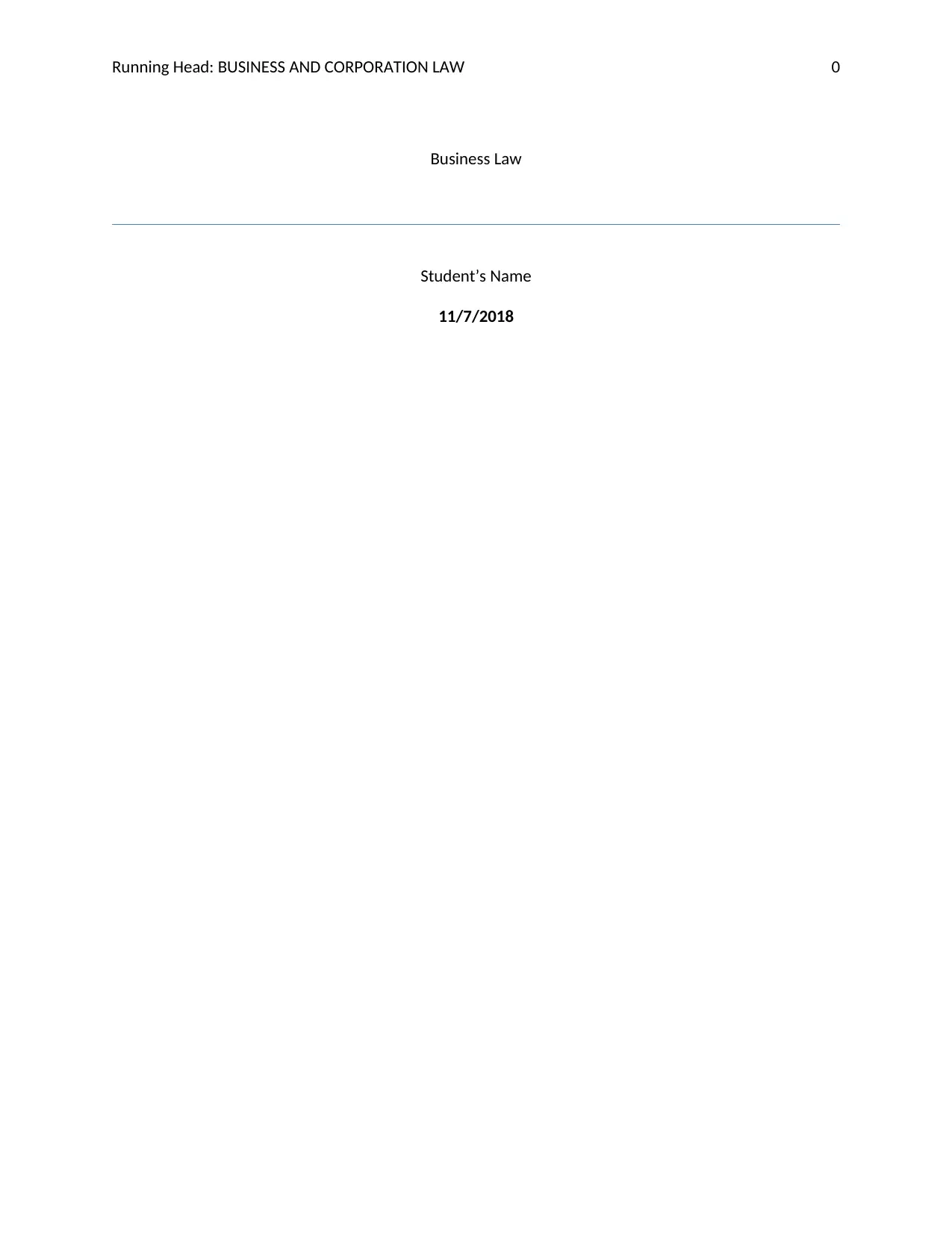
Running Head: BUSINESS AND CORPORATION LAW 0
Business Law
Student’s Name
11/7/2018
Business Law
Student’s Name
11/7/2018
Secure Best Marks with AI Grader
Need help grading? Try our AI Grader for instant feedback on your assignments.
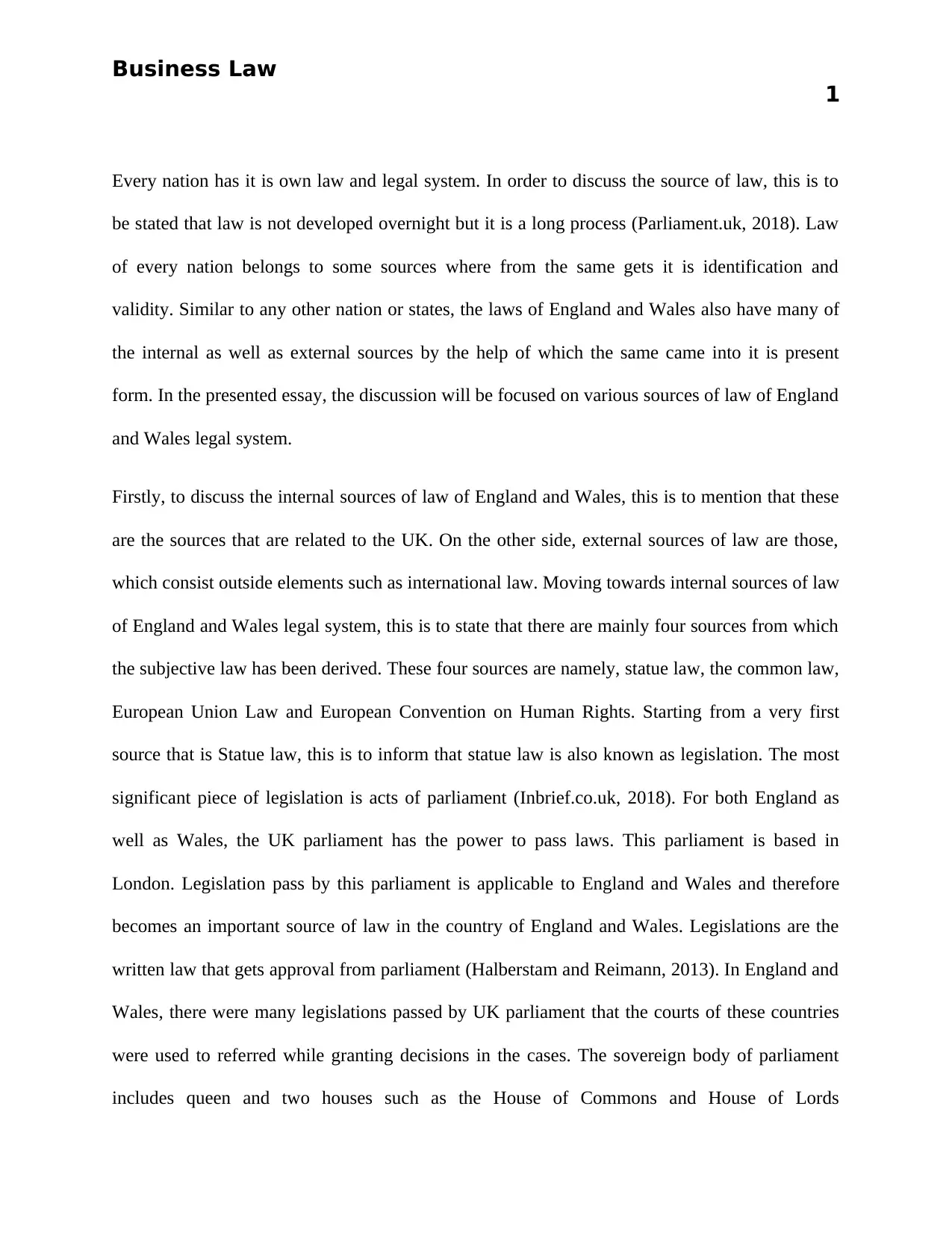
Business Law
1
Every nation has it is own law and legal system. In order to discuss the source of law, this is to
be stated that law is not developed overnight but it is a long process (Parliament.uk, 2018). Law
of every nation belongs to some sources where from the same gets it is identification and
validity. Similar to any other nation or states, the laws of England and Wales also have many of
the internal as well as external sources by the help of which the same came into it is present
form. In the presented essay, the discussion will be focused on various sources of law of England
and Wales legal system.
Firstly, to discuss the internal sources of law of England and Wales, this is to mention that these
are the sources that are related to the UK. On the other side, external sources of law are those,
which consist outside elements such as international law. Moving towards internal sources of law
of England and Wales legal system, this is to state that there are mainly four sources from which
the subjective law has been derived. These four sources are namely, statue law, the common law,
European Union Law and European Convention on Human Rights. Starting from a very first
source that is Statue law, this is to inform that statue law is also known as legislation. The most
significant piece of legislation is acts of parliament (Inbrief.co.uk, 2018). For both England as
well as Wales, the UK parliament has the power to pass laws. This parliament is based in
London. Legislation pass by this parliament is applicable to England and Wales and therefore
becomes an important source of law in the country of England and Wales. Legislations are the
written law that gets approval from parliament (Halberstam and Reimann, 2013). In England and
Wales, there were many legislations passed by UK parliament that the courts of these countries
were used to referred while granting decisions in the cases. The sovereign body of parliament
includes queen and two houses such as the House of Commons and House of Lords
1
Every nation has it is own law and legal system. In order to discuss the source of law, this is to
be stated that law is not developed overnight but it is a long process (Parliament.uk, 2018). Law
of every nation belongs to some sources where from the same gets it is identification and
validity. Similar to any other nation or states, the laws of England and Wales also have many of
the internal as well as external sources by the help of which the same came into it is present
form. In the presented essay, the discussion will be focused on various sources of law of England
and Wales legal system.
Firstly, to discuss the internal sources of law of England and Wales, this is to mention that these
are the sources that are related to the UK. On the other side, external sources of law are those,
which consist outside elements such as international law. Moving towards internal sources of law
of England and Wales legal system, this is to state that there are mainly four sources from which
the subjective law has been derived. These four sources are namely, statue law, the common law,
European Union Law and European Convention on Human Rights. Starting from a very first
source that is Statue law, this is to inform that statue law is also known as legislation. The most
significant piece of legislation is acts of parliament (Inbrief.co.uk, 2018). For both England as
well as Wales, the UK parliament has the power to pass laws. This parliament is based in
London. Legislation pass by this parliament is applicable to England and Wales and therefore
becomes an important source of law in the country of England and Wales. Legislations are the
written law that gets approval from parliament (Halberstam and Reimann, 2013). In England and
Wales, there were many legislations passed by UK parliament that the courts of these countries
were used to referred while granting decisions in the cases. The sovereign body of parliament
includes queen and two houses such as the House of Commons and House of Lords
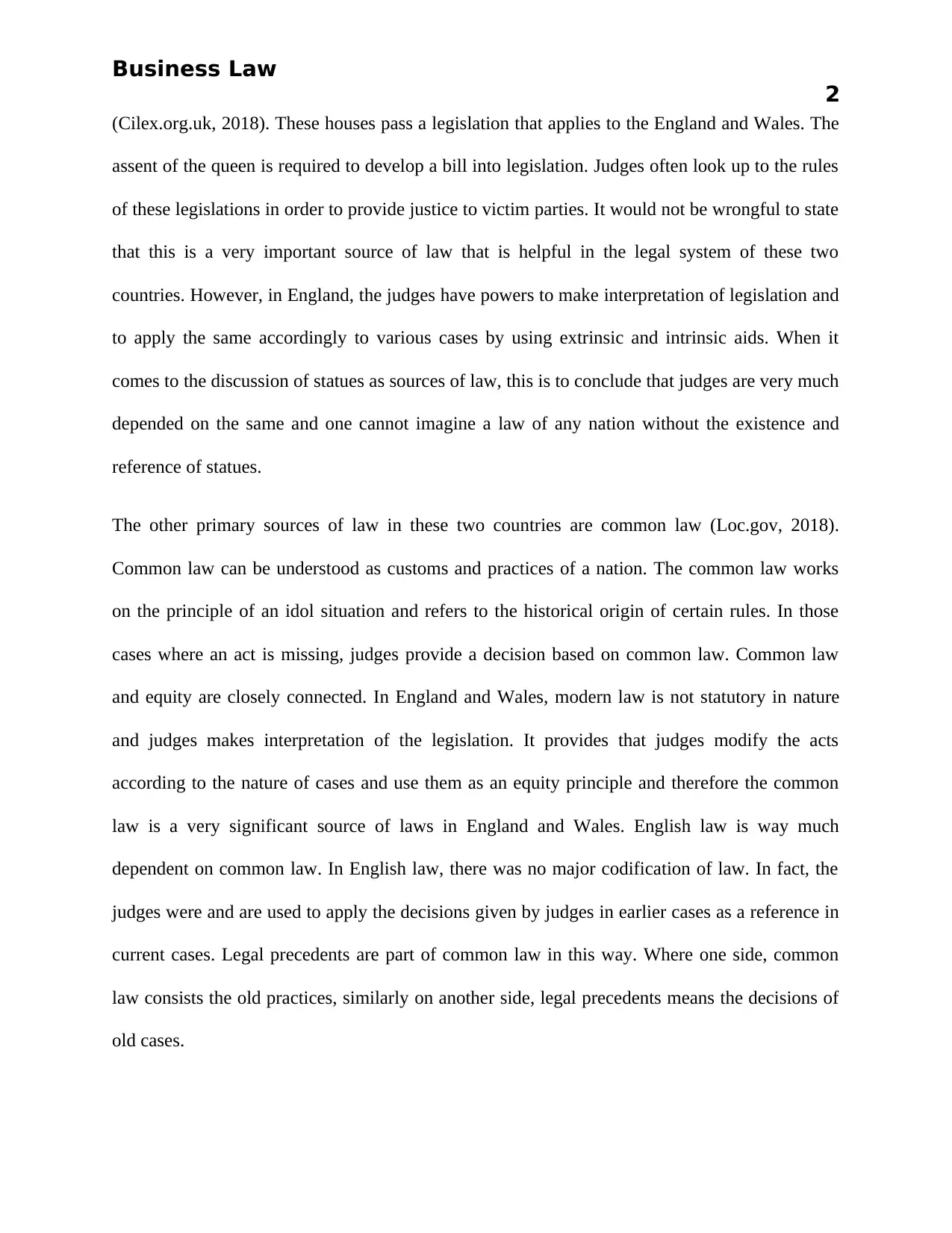
Business Law
2
(Cilex.org.uk, 2018). These houses pass a legislation that applies to the England and Wales. The
assent of the queen is required to develop a bill into legislation. Judges often look up to the rules
of these legislations in order to provide justice to victim parties. It would not be wrongful to state
that this is a very important source of law that is helpful in the legal system of these two
countries. However, in England, the judges have powers to make interpretation of legislation and
to apply the same accordingly to various cases by using extrinsic and intrinsic aids. When it
comes to the discussion of statues as sources of law, this is to conclude that judges are very much
depended on the same and one cannot imagine a law of any nation without the existence and
reference of statues.
The other primary sources of law in these two countries are common law (Loc.gov, 2018).
Common law can be understood as customs and practices of a nation. The common law works
on the principle of an idol situation and refers to the historical origin of certain rules. In those
cases where an act is missing, judges provide a decision based on common law. Common law
and equity are closely connected. In England and Wales, modern law is not statutory in nature
and judges makes interpretation of the legislation. It provides that judges modify the acts
according to the nature of cases and use them as an equity principle and therefore the common
law is a very significant source of laws in England and Wales. English law is way much
dependent on common law. In English law, there was no major codification of law. In fact, the
judges were and are used to apply the decisions given by judges in earlier cases as a reference in
current cases. Legal precedents are part of common law in this way. Where one side, common
law consists the old practices, similarly on another side, legal precedents means the decisions of
old cases.
2
(Cilex.org.uk, 2018). These houses pass a legislation that applies to the England and Wales. The
assent of the queen is required to develop a bill into legislation. Judges often look up to the rules
of these legislations in order to provide justice to victim parties. It would not be wrongful to state
that this is a very important source of law that is helpful in the legal system of these two
countries. However, in England, the judges have powers to make interpretation of legislation and
to apply the same accordingly to various cases by using extrinsic and intrinsic aids. When it
comes to the discussion of statues as sources of law, this is to conclude that judges are very much
depended on the same and one cannot imagine a law of any nation without the existence and
reference of statues.
The other primary sources of law in these two countries are common law (Loc.gov, 2018).
Common law can be understood as customs and practices of a nation. The common law works
on the principle of an idol situation and refers to the historical origin of certain rules. In those
cases where an act is missing, judges provide a decision based on common law. Common law
and equity are closely connected. In England and Wales, modern law is not statutory in nature
and judges makes interpretation of the legislation. It provides that judges modify the acts
according to the nature of cases and use them as an equity principle and therefore the common
law is a very significant source of laws in England and Wales. English law is way much
dependent on common law. In English law, there was no major codification of law. In fact, the
judges were and are used to apply the decisions given by judges in earlier cases as a reference in
current cases. Legal precedents are part of common law in this way. Where one side, common
law consists the old practices, similarly on another side, legal precedents means the decisions of
old cases.
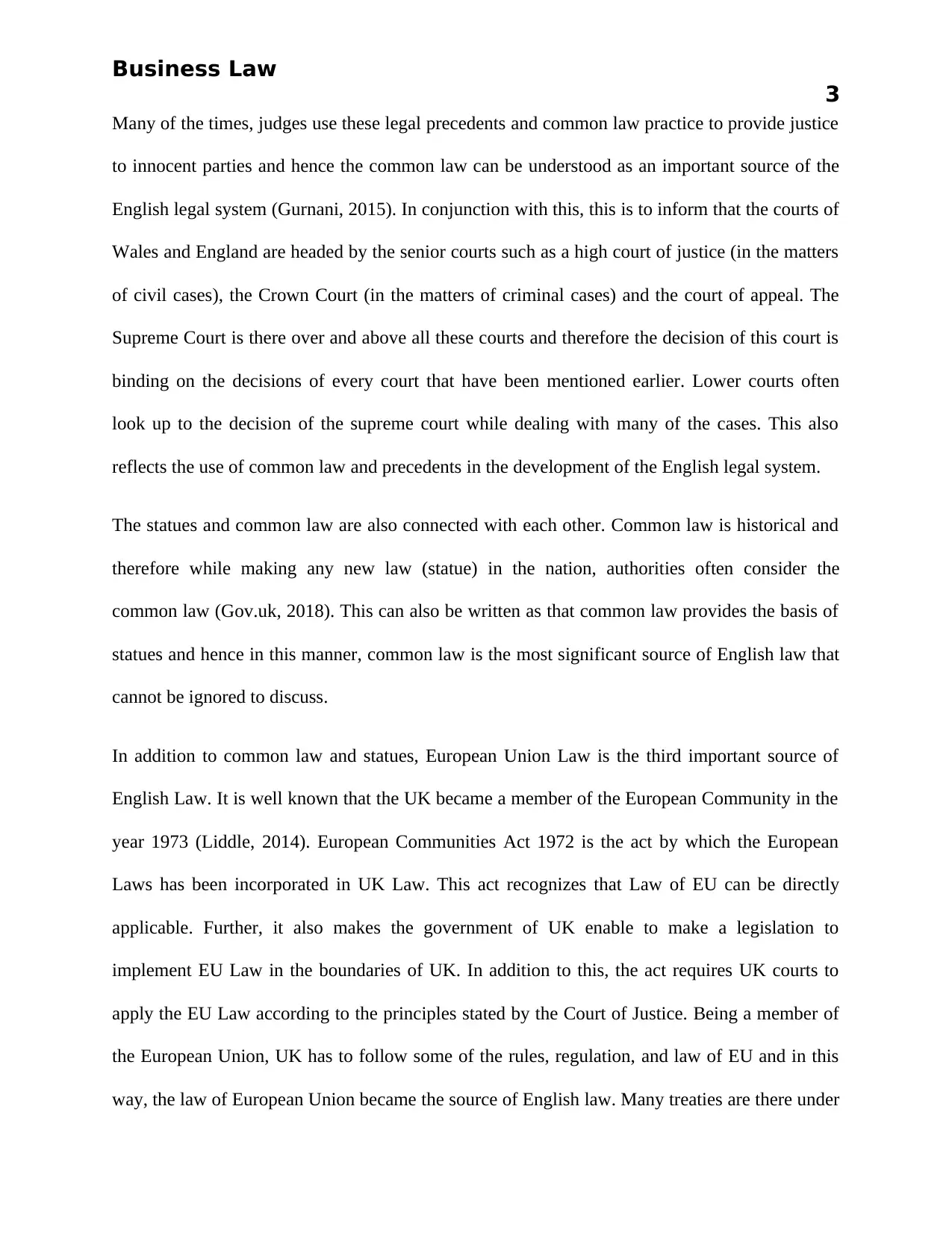
Business Law
3
Many of the times, judges use these legal precedents and common law practice to provide justice
to innocent parties and hence the common law can be understood as an important source of the
English legal system (Gurnani, 2015). In conjunction with this, this is to inform that the courts of
Wales and England are headed by the senior courts such as a high court of justice (in the matters
of civil cases), the Crown Court (in the matters of criminal cases) and the court of appeal. The
Supreme Court is there over and above all these courts and therefore the decision of this court is
binding on the decisions of every court that have been mentioned earlier. Lower courts often
look up to the decision of the supreme court while dealing with many of the cases. This also
reflects the use of common law and precedents in the development of the English legal system.
The statues and common law are also connected with each other. Common law is historical and
therefore while making any new law (statue) in the nation, authorities often consider the
common law (Gov.uk, 2018). This can also be written as that common law provides the basis of
statues and hence in this manner, common law is the most significant source of English law that
cannot be ignored to discuss.
In addition to common law and statues, European Union Law is the third important source of
English Law. It is well known that the UK became a member of the European Community in the
year 1973 (Liddle, 2014). European Communities Act 1972 is the act by which the European
Laws has been incorporated in UK Law. This act recognizes that Law of EU can be directly
applicable. Further, it also makes the government of UK enable to make a legislation to
implement EU Law in the boundaries of UK. In addition to this, the act requires UK courts to
apply the EU Law according to the principles stated by the Court of Justice. Being a member of
the European Union, UK has to follow some of the rules, regulation, and law of EU and in this
way, the law of European Union became the source of English law. Many treaties are there under
3
Many of the times, judges use these legal precedents and common law practice to provide justice
to innocent parties and hence the common law can be understood as an important source of the
English legal system (Gurnani, 2015). In conjunction with this, this is to inform that the courts of
Wales and England are headed by the senior courts such as a high court of justice (in the matters
of civil cases), the Crown Court (in the matters of criminal cases) and the court of appeal. The
Supreme Court is there over and above all these courts and therefore the decision of this court is
binding on the decisions of every court that have been mentioned earlier. Lower courts often
look up to the decision of the supreme court while dealing with many of the cases. This also
reflects the use of common law and precedents in the development of the English legal system.
The statues and common law are also connected with each other. Common law is historical and
therefore while making any new law (statue) in the nation, authorities often consider the
common law (Gov.uk, 2018). This can also be written as that common law provides the basis of
statues and hence in this manner, common law is the most significant source of English law that
cannot be ignored to discuss.
In addition to common law and statues, European Union Law is the third important source of
English Law. It is well known that the UK became a member of the European Community in the
year 1973 (Liddle, 2014). European Communities Act 1972 is the act by which the European
Laws has been incorporated in UK Law. This act recognizes that Law of EU can be directly
applicable. Further, it also makes the government of UK enable to make a legislation to
implement EU Law in the boundaries of UK. In addition to this, the act requires UK courts to
apply the EU Law according to the principles stated by the Court of Justice. Being a member of
the European Union, UK has to follow some of the rules, regulation, and law of EU and in this
way, the law of European Union became the source of English law. Many treaties are there under
Secure Best Marks with AI Grader
Need help grading? Try our AI Grader for instant feedback on your assignments.
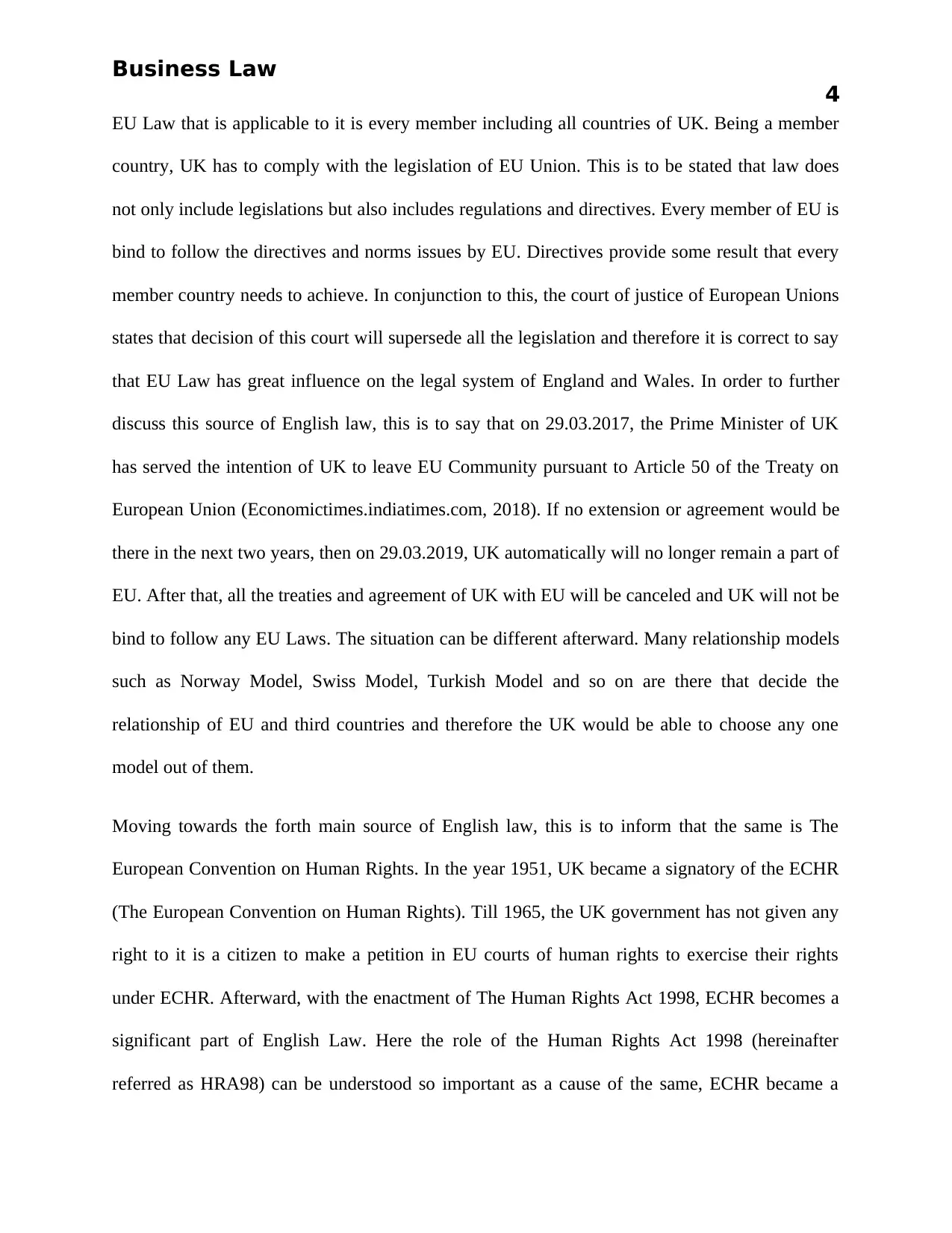
Business Law
4
EU Law that is applicable to it is every member including all countries of UK. Being a member
country, UK has to comply with the legislation of EU Union. This is to be stated that law does
not only include legislations but also includes regulations and directives. Every member of EU is
bind to follow the directives and norms issues by EU. Directives provide some result that every
member country needs to achieve. In conjunction to this, the court of justice of European Unions
states that decision of this court will supersede all the legislation and therefore it is correct to say
that EU Law has great influence on the legal system of England and Wales. In order to further
discuss this source of English law, this is to say that on 29.03.2017, the Prime Minister of UK
has served the intention of UK to leave EU Community pursuant to Article 50 of the Treaty on
European Union (Economictimes.indiatimes.com, 2018). If no extension or agreement would be
there in the next two years, then on 29.03.2019, UK automatically will no longer remain a part of
EU. After that, all the treaties and agreement of UK with EU will be canceled and UK will not be
bind to follow any EU Laws. The situation can be different afterward. Many relationship models
such as Norway Model, Swiss Model, Turkish Model and so on are there that decide the
relationship of EU and third countries and therefore the UK would be able to choose any one
model out of them.
Moving towards the forth main source of English law, this is to inform that the same is The
European Convention on Human Rights. In the year 1951, UK became a signatory of the ECHR
(The European Convention on Human Rights). Till 1965, the UK government has not given any
right to it is a citizen to make a petition in EU courts of human rights to exercise their rights
under ECHR. Afterward, with the enactment of The Human Rights Act 1998, ECHR becomes a
significant part of English Law. Here the role of the Human Rights Act 1998 (hereinafter
referred as HRA98) can be understood so important as a cause of the same, ECHR became a
4
EU Law that is applicable to it is every member including all countries of UK. Being a member
country, UK has to comply with the legislation of EU Union. This is to be stated that law does
not only include legislations but also includes regulations and directives. Every member of EU is
bind to follow the directives and norms issues by EU. Directives provide some result that every
member country needs to achieve. In conjunction to this, the court of justice of European Unions
states that decision of this court will supersede all the legislation and therefore it is correct to say
that EU Law has great influence on the legal system of England and Wales. In order to further
discuss this source of English law, this is to say that on 29.03.2017, the Prime Minister of UK
has served the intention of UK to leave EU Community pursuant to Article 50 of the Treaty on
European Union (Economictimes.indiatimes.com, 2018). If no extension or agreement would be
there in the next two years, then on 29.03.2019, UK automatically will no longer remain a part of
EU. After that, all the treaties and agreement of UK with EU will be canceled and UK will not be
bind to follow any EU Laws. The situation can be different afterward. Many relationship models
such as Norway Model, Swiss Model, Turkish Model and so on are there that decide the
relationship of EU and third countries and therefore the UK would be able to choose any one
model out of them.
Moving towards the forth main source of English law, this is to inform that the same is The
European Convention on Human Rights. In the year 1951, UK became a signatory of the ECHR
(The European Convention on Human Rights). Till 1965, the UK government has not given any
right to it is a citizen to make a petition in EU courts of human rights to exercise their rights
under ECHR. Afterward, with the enactment of The Human Rights Act 1998, ECHR becomes a
significant part of English Law. Here the role of the Human Rights Act 1998 (hereinafter
referred as HRA98) can be understood so important as a cause of the same, ECHR became a
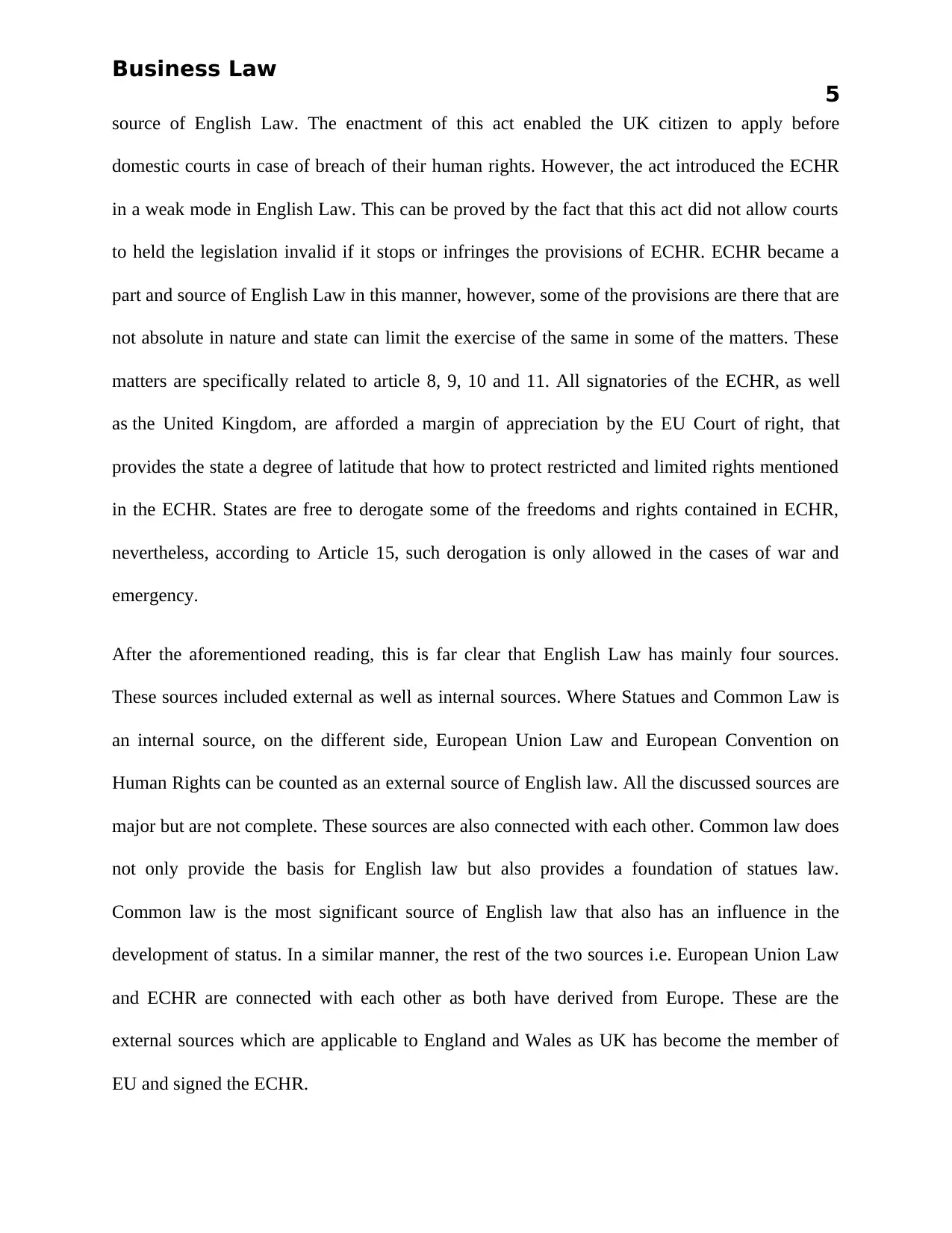
Business Law
5
source of English Law. The enactment of this act enabled the UK citizen to apply before
domestic courts in case of breach of their human rights. However, the act introduced the ECHR
in a weak mode in English Law. This can be proved by the fact that this act did not allow courts
to held the legislation invalid if it stops or infringes the provisions of ECHR. ECHR became a
part and source of English Law in this manner, however, some of the provisions are there that are
not absolute in nature and state can limit the exercise of the same in some of the matters. These
matters are specifically related to article 8, 9, 10 and 11. All signatories of the ECHR, as well
as the United Kingdom, are afforded a margin of appreciation by the EU Court of right, that
provides the state a degree of latitude that how to protect restricted and limited rights mentioned
in the ECHR. States are free to derogate some of the freedoms and rights contained in ECHR,
nevertheless, according to Article 15, such derogation is only allowed in the cases of war and
emergency.
After the aforementioned reading, this is far clear that English Law has mainly four sources.
These sources included external as well as internal sources. Where Statues and Common Law is
an internal source, on the different side, European Union Law and European Convention on
Human Rights can be counted as an external source of English law. All the discussed sources are
major but are not complete. These sources are also connected with each other. Common law does
not only provide the basis for English law but also provides a foundation of statues law.
Common law is the most significant source of English law that also has an influence in the
development of status. In a similar manner, the rest of the two sources i.e. European Union Law
and ECHR are connected with each other as both have derived from Europe. These are the
external sources which are applicable to England and Wales as UK has become the member of
EU and signed the ECHR.
5
source of English Law. The enactment of this act enabled the UK citizen to apply before
domestic courts in case of breach of their human rights. However, the act introduced the ECHR
in a weak mode in English Law. This can be proved by the fact that this act did not allow courts
to held the legislation invalid if it stops or infringes the provisions of ECHR. ECHR became a
part and source of English Law in this manner, however, some of the provisions are there that are
not absolute in nature and state can limit the exercise of the same in some of the matters. These
matters are specifically related to article 8, 9, 10 and 11. All signatories of the ECHR, as well
as the United Kingdom, are afforded a margin of appreciation by the EU Court of right, that
provides the state a degree of latitude that how to protect restricted and limited rights mentioned
in the ECHR. States are free to derogate some of the freedoms and rights contained in ECHR,
nevertheless, according to Article 15, such derogation is only allowed in the cases of war and
emergency.
After the aforementioned reading, this is far clear that English Law has mainly four sources.
These sources included external as well as internal sources. Where Statues and Common Law is
an internal source, on the different side, European Union Law and European Convention on
Human Rights can be counted as an external source of English law. All the discussed sources are
major but are not complete. These sources are also connected with each other. Common law does
not only provide the basis for English law but also provides a foundation of statues law.
Common law is the most significant source of English law that also has an influence in the
development of status. In a similar manner, the rest of the two sources i.e. European Union Law
and ECHR are connected with each other as both have derived from Europe. These are the
external sources which are applicable to England and Wales as UK has become the member of
EU and signed the ECHR.
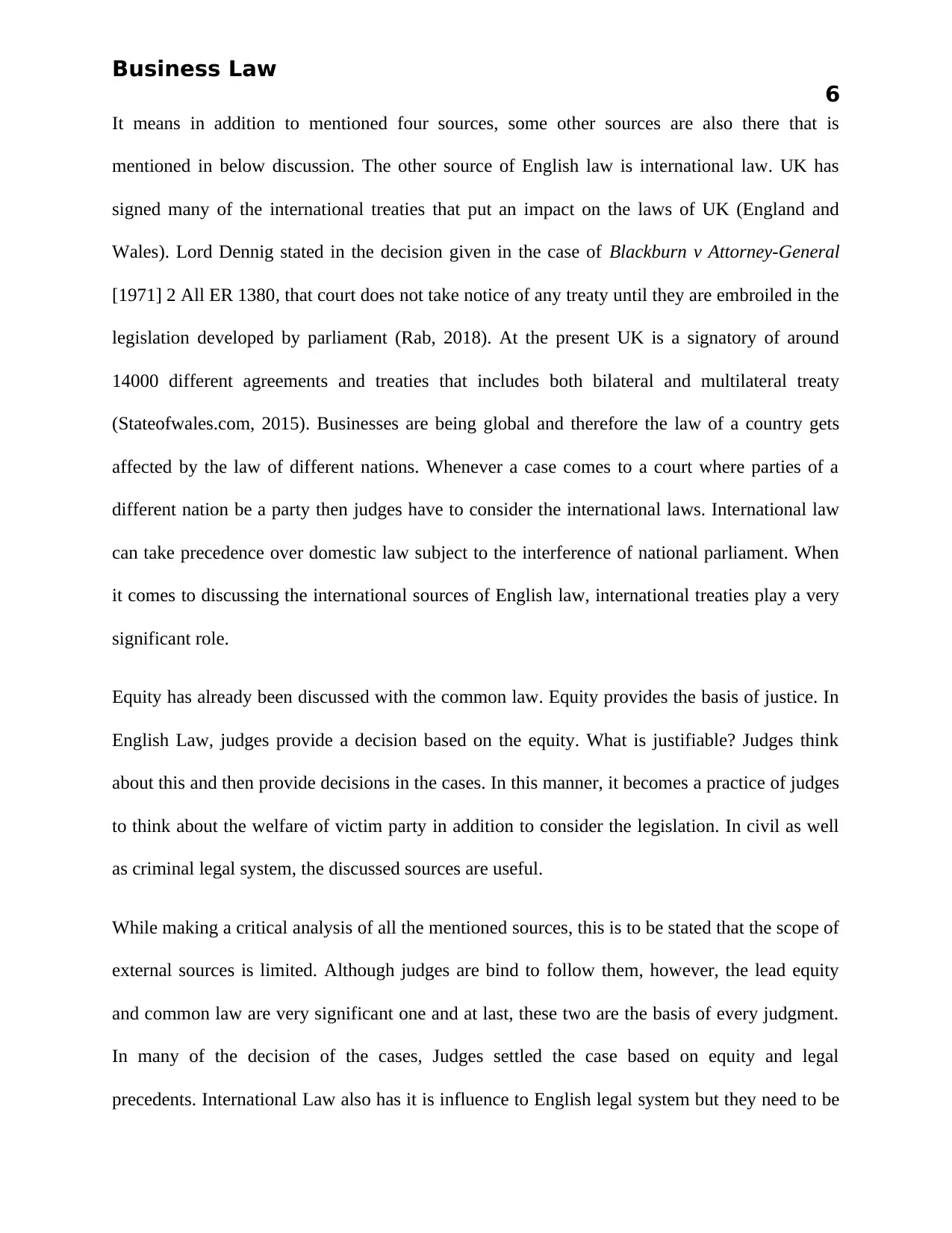
Business Law
6
It means in addition to mentioned four sources, some other sources are also there that is
mentioned in below discussion. The other source of English law is international law. UK has
signed many of the international treaties that put an impact on the laws of UK (England and
Wales). Lord Dennig stated in the decision given in the case of Blackburn v Attorney-General
[1971] 2 All ER 1380, that court does not take notice of any treaty until they are embroiled in the
legislation developed by parliament (Rab, 2018). At the present UK is a signatory of around
14000 different agreements and treaties that includes both bilateral and multilateral treaty
(Stateofwales.com, 2015). Businesses are being global and therefore the law of a country gets
affected by the law of different nations. Whenever a case comes to a court where parties of a
different nation be a party then judges have to consider the international laws. International law
can take precedence over domestic law subject to the interference of national parliament. When
it comes to discussing the international sources of English law, international treaties play a very
significant role.
Equity has already been discussed with the common law. Equity provides the basis of justice. In
English Law, judges provide a decision based on the equity. What is justifiable? Judges think
about this and then provide decisions in the cases. In this manner, it becomes a practice of judges
to think about the welfare of victim party in addition to consider the legislation. In civil as well
as criminal legal system, the discussed sources are useful.
While making a critical analysis of all the mentioned sources, this is to be stated that the scope of
external sources is limited. Although judges are bind to follow them, however, the lead equity
and common law are very significant one and at last, these two are the basis of every judgment.
In many of the decision of the cases, Judges settled the case based on equity and legal
precedents. International Law also has it is influence to English legal system but they need to be
6
It means in addition to mentioned four sources, some other sources are also there that is
mentioned in below discussion. The other source of English law is international law. UK has
signed many of the international treaties that put an impact on the laws of UK (England and
Wales). Lord Dennig stated in the decision given in the case of Blackburn v Attorney-General
[1971] 2 All ER 1380, that court does not take notice of any treaty until they are embroiled in the
legislation developed by parliament (Rab, 2018). At the present UK is a signatory of around
14000 different agreements and treaties that includes both bilateral and multilateral treaty
(Stateofwales.com, 2015). Businesses are being global and therefore the law of a country gets
affected by the law of different nations. Whenever a case comes to a court where parties of a
different nation be a party then judges have to consider the international laws. International law
can take precedence over domestic law subject to the interference of national parliament. When
it comes to discussing the international sources of English law, international treaties play a very
significant role.
Equity has already been discussed with the common law. Equity provides the basis of justice. In
English Law, judges provide a decision based on the equity. What is justifiable? Judges think
about this and then provide decisions in the cases. In this manner, it becomes a practice of judges
to think about the welfare of victim party in addition to consider the legislation. In civil as well
as criminal legal system, the discussed sources are useful.
While making a critical analysis of all the mentioned sources, this is to be stated that the scope of
external sources is limited. Although judges are bind to follow them, however, the lead equity
and common law are very significant one and at last, these two are the basis of every judgment.
In many of the decision of the cases, Judges settled the case based on equity and legal
precedents. International Law also has it is influence to English legal system but they need to be
Paraphrase This Document
Need a fresh take? Get an instant paraphrase of this document with our AI Paraphraser
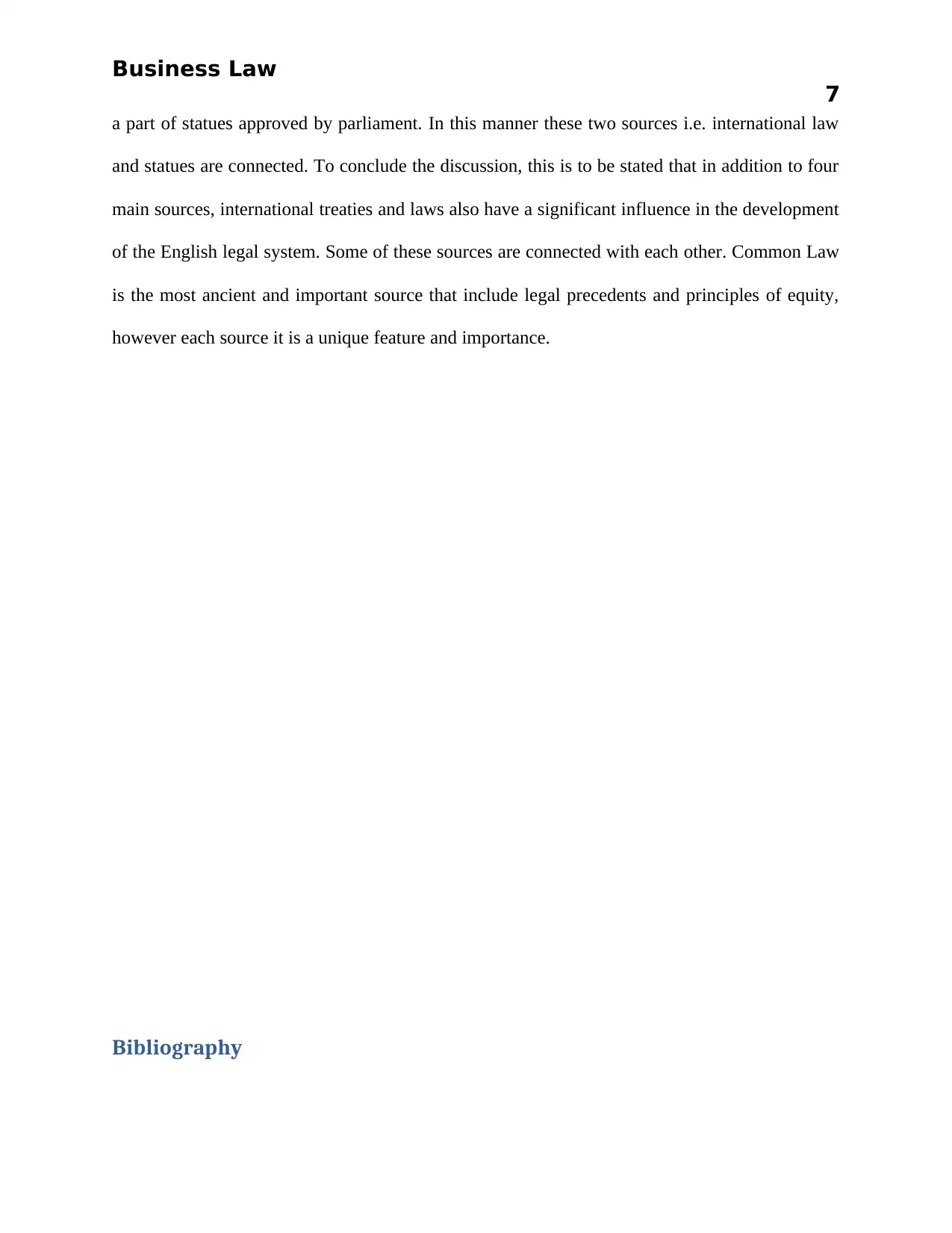
Business Law
7
a part of statues approved by parliament. In this manner these two sources i.e. international law
and statues are connected. To conclude the discussion, this is to be stated that in addition to four
main sources, international treaties and laws also have a significant influence in the development
of the English legal system. Some of these sources are connected with each other. Common Law
is the most ancient and important source that include legal precedents and principles of equity,
however each source it is a unique feature and importance.
Bibliography
7
a part of statues approved by parliament. In this manner these two sources i.e. international law
and statues are connected. To conclude the discussion, this is to be stated that in addition to four
main sources, international treaties and laws also have a significant influence in the development
of the English legal system. Some of these sources are connected with each other. Common Law
is the most ancient and important source that include legal precedents and principles of equity,
however each source it is a unique feature and importance.
Bibliography
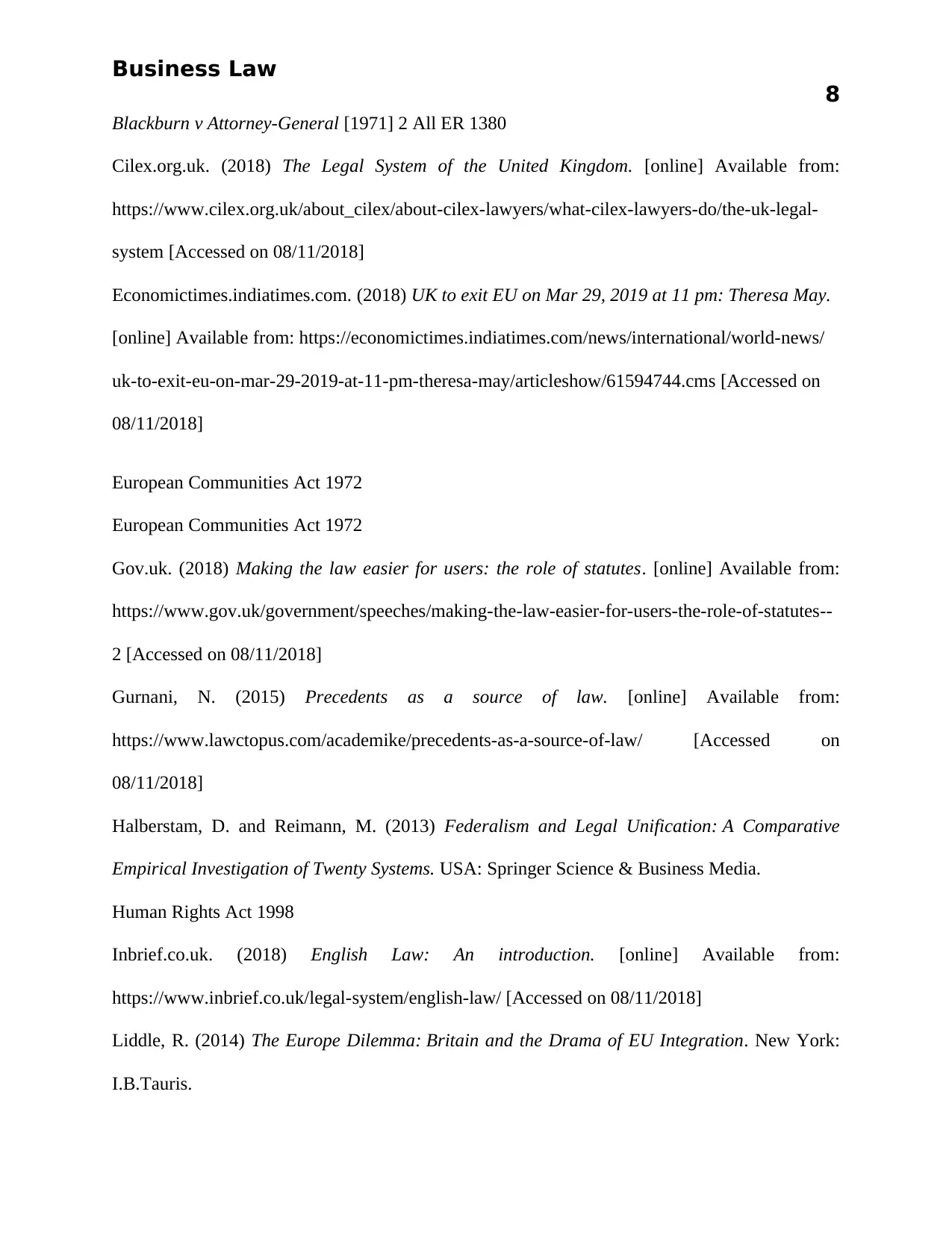
Business Law
8
Blackburn v Attorney-General [1971] 2 All ER 1380
Cilex.org.uk. (2018) The Legal System of the United Kingdom. [online] Available from:
https://www.cilex.org.uk/about_cilex/about-cilex-lawyers/what-cilex-lawyers-do/the-uk-legal-
system [Accessed on 08/11/2018]
Economictimes.indiatimes.com. (2018) UK to exit EU on Mar 29, 2019 at 11 pm: Theresa May.
[online] Available from: https://economictimes.indiatimes.com/news/international/world-news/
uk-to-exit-eu-on-mar-29-2019-at-11-pm-theresa-may/articleshow/61594744.cms [Accessed on
08/11/2018]
European Communities Act 1972
European Communities Act 1972
Gov.uk. (2018) Making the law easier for users: the role of statutes. [online] Available from:
https://www.gov.uk/government/speeches/making-the-law-easier-for-users-the-role-of-statutes--
2 [Accessed on 08/11/2018]
Gurnani, N. (2015) Precedents as a source of law. [online] Available from:
https://www.lawctopus.com/academike/precedents-as-a-source-of-law/ [Accessed on
08/11/2018]
Halberstam, D. and Reimann, M. (2013) Federalism and Legal Unification: A Comparative
Empirical Investigation of Twenty Systems. USA: Springer Science & Business Media.
Human Rights Act 1998
Inbrief.co.uk. (2018) English Law: An introduction. [online] Available from:
https://www.inbrief.co.uk/legal-system/english-law/ [Accessed on 08/11/2018]
Liddle, R. (2014) The Europe Dilemma: Britain and the Drama of EU Integration. New York:
I.B.Tauris.
8
Blackburn v Attorney-General [1971] 2 All ER 1380
Cilex.org.uk. (2018) The Legal System of the United Kingdom. [online] Available from:
https://www.cilex.org.uk/about_cilex/about-cilex-lawyers/what-cilex-lawyers-do/the-uk-legal-
system [Accessed on 08/11/2018]
Economictimes.indiatimes.com. (2018) UK to exit EU on Mar 29, 2019 at 11 pm: Theresa May.
[online] Available from: https://economictimes.indiatimes.com/news/international/world-news/
uk-to-exit-eu-on-mar-29-2019-at-11-pm-theresa-may/articleshow/61594744.cms [Accessed on
08/11/2018]
European Communities Act 1972
European Communities Act 1972
Gov.uk. (2018) Making the law easier for users: the role of statutes. [online] Available from:
https://www.gov.uk/government/speeches/making-the-law-easier-for-users-the-role-of-statutes--
2 [Accessed on 08/11/2018]
Gurnani, N. (2015) Precedents as a source of law. [online] Available from:
https://www.lawctopus.com/academike/precedents-as-a-source-of-law/ [Accessed on
08/11/2018]
Halberstam, D. and Reimann, M. (2013) Federalism and Legal Unification: A Comparative
Empirical Investigation of Twenty Systems. USA: Springer Science & Business Media.
Human Rights Act 1998
Inbrief.co.uk. (2018) English Law: An introduction. [online] Available from:
https://www.inbrief.co.uk/legal-system/english-law/ [Accessed on 08/11/2018]
Liddle, R. (2014) The Europe Dilemma: Britain and the Drama of EU Integration. New York:
I.B.Tauris.
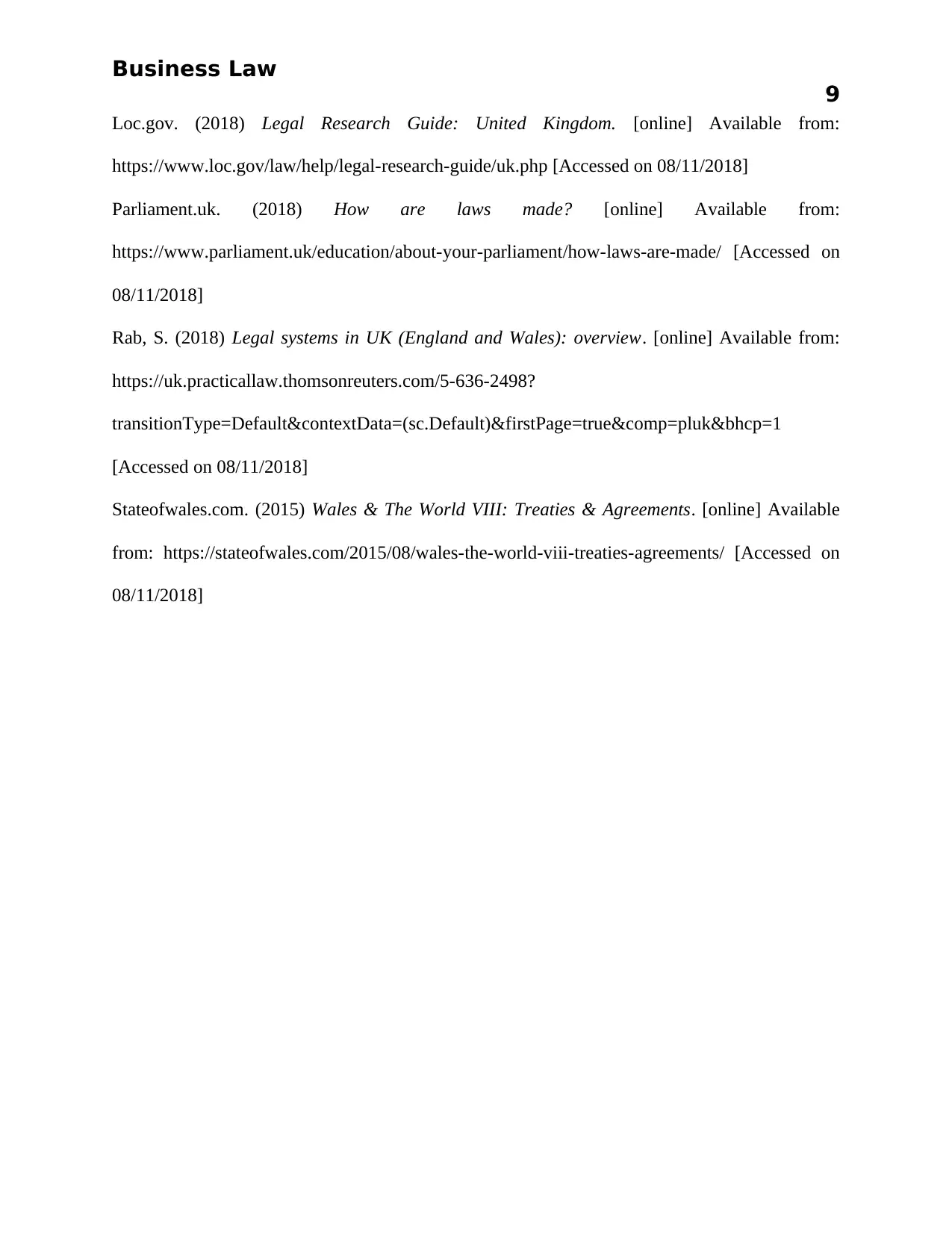
Business Law
9
Loc.gov. (2018) Legal Research Guide: United Kingdom. [online] Available from:
https://www.loc.gov/law/help/legal-research-guide/uk.php [Accessed on 08/11/2018]
Parliament.uk. (2018) How are laws made? [online] Available from:
https://www.parliament.uk/education/about-your-parliament/how-laws-are-made/ [Accessed on
08/11/2018]
Rab, S. (2018) Legal systems in UK (England and Wales): overview. [online] Available from:
https://uk.practicallaw.thomsonreuters.com/5-636-2498?
transitionType=Default&contextData=(sc.Default)&firstPage=true&comp=pluk&bhcp=1
[Accessed on 08/11/2018]
Stateofwales.com. (2015) Wales & The World VIII: Treaties & Agreements. [online] Available
from: https://stateofwales.com/2015/08/wales-the-world-viii-treaties-agreements/ [Accessed on
08/11/2018]
9
Loc.gov. (2018) Legal Research Guide: United Kingdom. [online] Available from:
https://www.loc.gov/law/help/legal-research-guide/uk.php [Accessed on 08/11/2018]
Parliament.uk. (2018) How are laws made? [online] Available from:
https://www.parliament.uk/education/about-your-parliament/how-laws-are-made/ [Accessed on
08/11/2018]
Rab, S. (2018) Legal systems in UK (England and Wales): overview. [online] Available from:
https://uk.practicallaw.thomsonreuters.com/5-636-2498?
transitionType=Default&contextData=(sc.Default)&firstPage=true&comp=pluk&bhcp=1
[Accessed on 08/11/2018]
Stateofwales.com. (2015) Wales & The World VIII: Treaties & Agreements. [online] Available
from: https://stateofwales.com/2015/08/wales-the-world-viii-treaties-agreements/ [Accessed on
08/11/2018]
1 out of 10
Related Documents
Your All-in-One AI-Powered Toolkit for Academic Success.
+13062052269
info@desklib.com
Available 24*7 on WhatsApp / Email
![[object Object]](/_next/static/media/star-bottom.7253800d.svg)
Unlock your academic potential
© 2024 | Zucol Services PVT LTD | All rights reserved.





